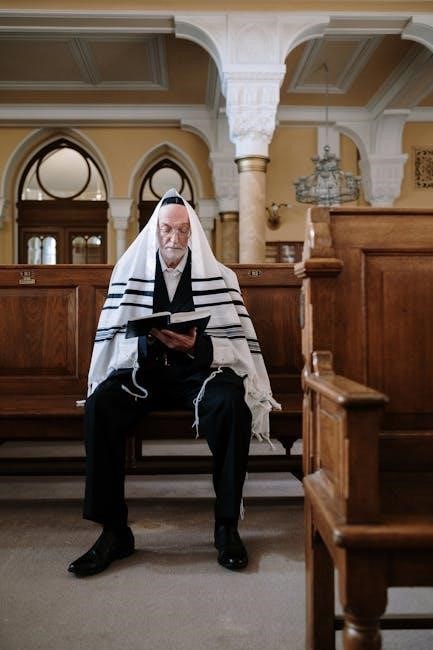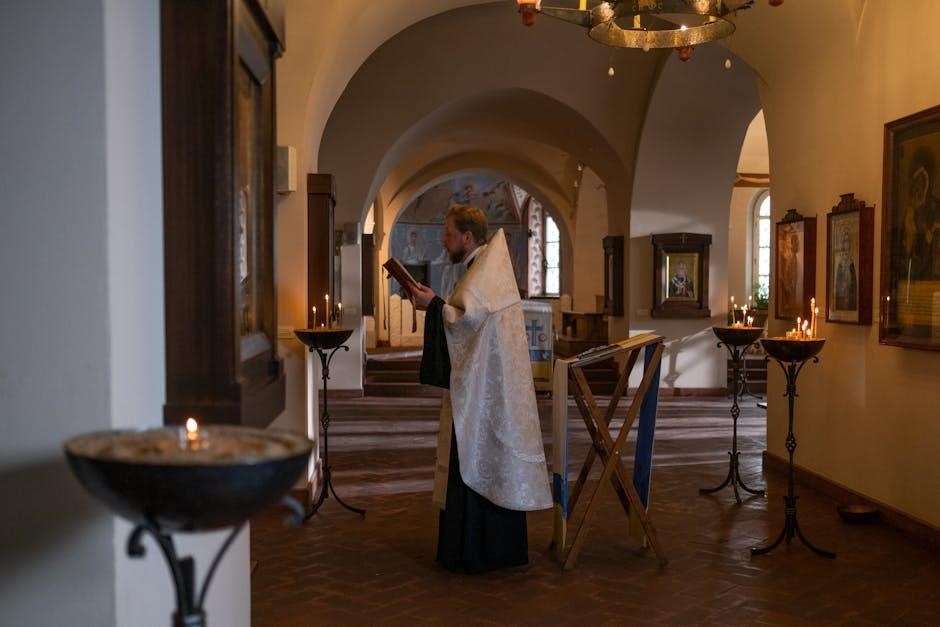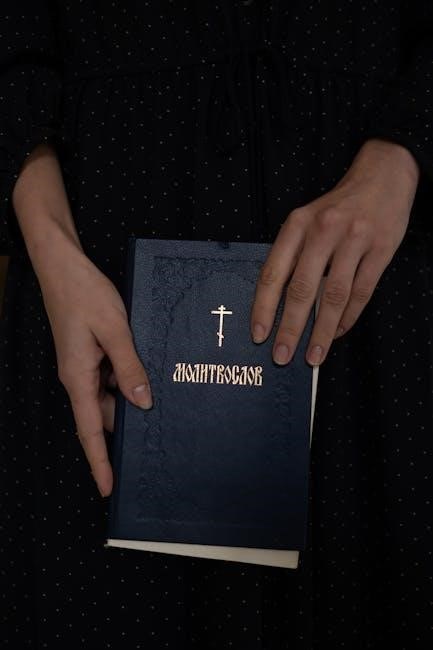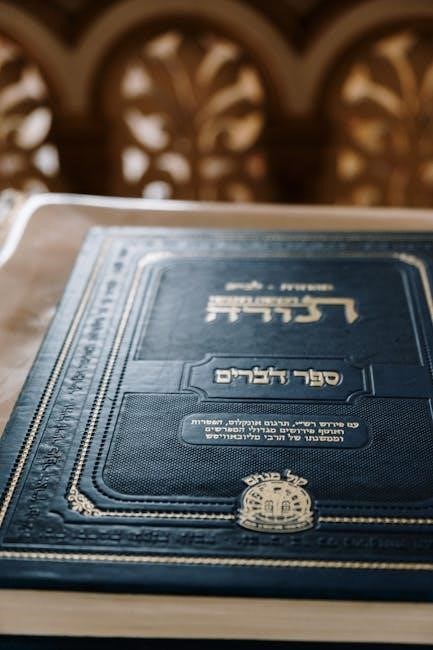Preface
The Orthodox Prayer Book serves as a spiritual guide, bridging the gap for younger generations to engage with traditional prayers and liturgical services in an accessible format.
1.1 Purpose of the Orthodox Prayer Book
The primary purpose of the Orthodox Prayer Book is to provide a comprehensive and accessible guide for individuals seeking to deepen their spiritual life through prayer. It bridges the gap for younger generations by offering services often conducted in foreign languages in a more understandable form. The book includes essential prayers, hymns, and liturgical responses, ensuring the preservation of Orthodox traditions. Its rhythmical translations enhance worship, making it easier for modern believers to engage. Additionally, it serves as a valuable resource for daily devotion, fostering a consistent prayer life and connecting users to the rich spiritual heritage of the Orthodox Church.
1.2 Target Audience
The Orthodox Prayer Book is primarily designed for the younger generation of Eastern Orthodox Christians, helping them follow services often conducted in foreign languages. It is also ideal for those seeking a modern, accessible resource for daily prayer and spiritual growth. The book caters to individuals and families alike, providing a simplified yet comprehensive guide to Orthodox devotion. Additionally, it serves as a valuable tool for newcomers to the faith, offering clear translations and structured prayers. Its compact design makes it suitable for personal use, ensuring that anyone can integrate Orthodox traditions into their daily lives with ease and understanding.
1.3 Special Features of the Translation
This Orthodox Prayer Book stands out for its rhythmical translation of liturgical responses and hymns, ensuring a melodious and prayerful experience. The translation maintains the spiritual depth of original texts while making them accessible in modern English. It includes simplified versions of key services, omitting complex liturgical elements to enhance clarity. The book also features a structured format, guiding users through morning, mid-day, and evening prayers seamlessly. These adaptations ensure that the essence of Orthodox spirituality is preserved, making it easier for younger generations and English-speaking faithful to engage deeply with their prayer life. This thoughtful approach fosters a meaningful connection with tradition while embracing contemporary accessibility.

Structure of the Orthodox Prayer Book
The Orthodox Prayer Book is organized into morning, mid-day, and evening prayers, with additional sections for specific occasions, mealtime blessings, and liturgical hymns.
2.1 Morning Prayers
The morning prayers in the Orthodox Prayer Book are designed to begin the day with spiritual reflection and thanksgiving. They include the Symbol of Faith (Nicene Creed), prayers to the Holy Trinity, and selections from the Psalms. These prayers help believers acknowledge God’s presence and seek His guidance. The structure follows traditional liturgical practices, emphasizing humility, gratitude, and preparation for the day ahead. Many editions also incorporate brief hymns and troparia, creating a rhythm that fosters devotion. The morning prayers serve as a foundational element in the daily spiritual routine, encouraging believers to connect with God before engaging in worldly activities.
2.2 Mid-Day Prayers
The mid-day prayers in the Orthodox Prayer Book offer a moment of spiritual pause amidst daily activities. These prayers are concise yet profound, typically including short invocations, the Jesus Prayer, and brief supplications for strength and guidance. They serve as a reminder to seek God’s presence even during busy times, fostering mindfulness and humility. Many versions of the prayer book include specific prayers for this period, emphasizing themes of gratitude, repentance, and divine assistance. The mid-day prayers act as a spiritual anchor, helping believers maintain their connection with God throughout the day and preparing them for the evening’s devotions.
2.3 Evening Prayers
The evening prayers in the Orthodox Prayer Book are a sacred conclusion to the day, focusing on reflection, gratitude, and preparation for rest. These prayers often include the Trisagion Prayers, psalm verses, and heartfelt supplications for forgiveness and protection. Many versions incorporate the Prayer of St. Ephraim, emphasizing themes of repentance and humility. The evening prayers also include intercessions for loved ones and remembrance of the departed, fostering a sense of unity with the Church Militant and Triumphant. They offer a tranquil transition into the night, inviting believers to surrender to God’s will and seek His mercy and guidance. This practice nurtures spiritual calm and readiness for the eternal rest.
Key Prayers and Hymns
This section highlights essential prayers like the Nicene Creed, the Lord’s Prayer, and Troparia to the Holy Trinity, fostering spiritual growth and deeper faith connection.
3.1 The Symbol of Faith (Nicene Creed)
The Nicene Creed is a cornerstone of Orthodox Christian doctrine, succinctly summarizing the faith. It is recited during Divine Liturgy and is a declaration of belief in the Holy Trinity, the incarnation of Jesus Christ, and the resurrection. Found in the Orthodox Prayer Book, it serves as a unifying statement of faith for believers, reinforcing core theological truths. Its inclusion in daily prayers helps individuals affirm their commitment to the teachings of the Church, fostering spiritual unity and a deep understanding of the Christian mysteries. This creed is a vital component of both liturgical and personal worship.
3.2 The Lord’s Prayer
The Lord’s Prayer is a foundational Christian prayer taught by Jesus Christ, as recorded in the Gospels of Matthew and Luke. It is a model for all prayer, emphasizing reverence, forgiveness, and trust in God’s providence. In the Orthodox Prayer Book, it is prominently featured as a daily devotion, guiding believers to align their will with God’s. This prayer is recited in both personal and liturgical settings, serving as a unifying expression of faith. Its inclusion in the Prayer Book ensures accessibility for all, fostering a deeper connection to Christ’s teachings and strengthening one’s spiritual life through consistent use.
3.4 Troparia to the Holy Trinity
Troparia are hymns sung in honor of the Holy Trinity, expressing devotion and praise for God’s divine nature. These hymns are integral to Orthodox worship, often chanted during services to glorify the Father, Son, and Holy Spirit. In the Orthodox Prayer Book, Troparia to the Holy Trinity are included to deepen spiritual reflection and enhance liturgical participation. Their rhythmic and melodious composition makes them a beautiful way to articulate faith and reverence. By reciting or singing these Troparia, believers affirm their belief in the Triune God, fostering a deeper connection to the mysteries of the faith. They are a vital part of daily prayers and liturgical celebrations.

Prayers for Specific Occasions
The Orthodox Prayer Book includes prayers for various occasions, such as before and after communion, mealtime blessings, and intercessions for the faithful, enriching spiritual practice.
4.1 Prayers Before Communion
Prayers before communion in the Orthodox Prayer Book are deeply profound, expressing humility and faith. They include confessions of sin, expressions of unworthiness, and supplications for mercy. These prayers prepare the soul for the sacred act of receiving Holy Communion, emphasizing the believer’s need for purification and grace. They reflect the teachings of the Church Fathers, encouraging believers to approach the Eucharist with reverence and sincerity. By reciting these prayers, the faithful affirm their commitment to spiritual growth and union with Christ. These prayers are essential for fostering a deeper connection with the divine and the mysteries of the faith.
4.2 Prayers After Communion
Prayers after communion in the Orthodox Prayer Book are a heartfelt expression of gratitude and a plea for the blessings received through the Eucharist. These prayers emphasize the transformative power of Holy Communion, asking that its grace be sealed in the heart and reflected in one’s life. They include supplications for strength to live virtuously, to avoid sin, and to remain steadfast in faith. The prayers also invoke divine protection and guidance, ensuring that the spiritual benefits of communion are not lost. They serve as a continuation of the sacred journey, fostering a deeper commitment to a life pleasing to God.
4.3 Prayers for Meal Time
Prayers for meal time in the Orthodox Prayer Book are a beautiful expression of gratitude and blessing. These prayers are recited before and after meals to acknowledge God’s provision and to seek His continued favor. They emphasize thanksgiving for the food received and ask for blessings upon those who prepared and partook of the meal. Additionally, they include intercessions for the hungry and the needy, reflecting the Orthodox emphasis on compassion and sharing. These prayers serve as a reminder to sanctify all aspects of daily life, transforming even the simplest acts into moments of worship and connection with God.

Liturgical Hymns and Responses
Liturgical hymns and responses are an integral part of Orthodox worship, expressing devotion and theological truths. The Magnificat, a canticle from Luke 1:46-55, is prominently featured, along with Apolytikia and Kontakia, which are hymns honoring feasts and saints, enriching the liturgical experience.
5.1 The Magnificat
The Magnificat, a sacred canticle from Luke 1:46-55, is a profound expression of praise and thanksgiving. It is attributed to the Virgin Mary, celebrating God’s mercy and divine plan. In Orthodox liturgical tradition, the Magnificat is often chanted during Matins and Vespers, particularly in feasts dedicated to the Theotokos. Its inclusion in the prayer book highlights Mary’s role as a model of humility and faith. The hymn’s rich theological content and poetic beauty make it a cornerstone of Orthodox worship, fostering devotion and reflection among the faithful. Its rhythmic rendering enhances congregational participation, preserving the liturgical heritage.
5.2 Apolytikia and Kontakia
Apolytikia and Kontakia are sacred hymns integral to Orthodox worship, expressing praise and theological truths. Apolytikia, or dismissal hymns, are sung at the end of services, highlighting the feast or saint being celebrated. Kontakia, longer narrative hymns, often tell biblical or hagiographical stories. Both forms are rich in spiritual depth, guiding believers in worship and doctrine. Their inclusion in the prayer book ensures accessibility for personal devotion. The hymns vary by feast day and season, reflecting the liturgical cycle. Their poetic and melodic structure enhances worship, fostering a deeper connection to the faith; These hymns are vital in preserving Orthodox tradition and enriching spiritual life.
The Role of Prayer in Orthodox Spirituality
Prayer is central to Orthodox spirituality, fostering a deep relationship with God. It guides believers to seek divine grace and live according to His will.
6.1 The Aim of Prayer
The aim of prayer in Orthodox spirituality is to cultivate a deep, personal relationship with God, seeking His grace and guidance. It is a means of expressing gratitude, confessing sins, and interceding for others. Through prayer, believers strive to align their will with God’s, fostering humility, love, and spiritual growth. The Orthodox Prayer Book emphasizes that prayer should be heartfelt and consistent, transforming one’s life according to God’s will. Regular prayer helps believers grow in faith, overcome challenges, and attain spiritual illumination, ultimately uniting with God in love and service. Prayer is thus a cornerstone of Orthodox Christian life and devotion.
6.2 Prayer as a Daily Spiritual Exercise
Prayer is a vital daily spiritual exercise in Orthodox Christianity, fostering intimacy with God and nurturing the soul. Through consistent practice, believers cultivate humility, patience, and love, drawing strength from divine grace. Morning and evening prayers, outlined in the Orthodox Prayer Book, provide structured moments for reflection, thanksgiving, and intercession. Regular prayer helps believers navigate life’s challenges with faith and resilience, ensuring spiritual growth and stability. By prioritizing prayer, one embodies the teachings of Christ, transforming daily life into a continuous act of worship and devotion, guided by the timeless wisdom of the Orthodox tradition.

The Significance of the Prayer Book
The Orthodox Prayer Book is a sacred companion for spiritual growth, offering structured prayers that deepen faith, unite believers, and connect them to the Church’s timeless traditions.
7.1 Aids for Younger Generations
The Orthodox Prayer Book is a vital resource for younger generations, helping them connect with their faith in a modern world. Its structured prayers and accessible language make it easier for young people to engage with traditional liturgical practices. Designed to bridge the gap between ancient traditions and contemporary life, the prayer book ensures that the spiritual heritage of the Orthodox Church remains relevant and meaningful. By providing clear and understandable content, it fosters a deeper understanding of faith and encourages daily prayer among the youth, ensuring the continuation of Orthodox spirituality.
7.2 A Bridge to the Liturgical Life
The Orthodox Prayer Book acts as a bridge to the liturgical life of the Church, offering a comprehensive guide to participate in daily prayers and services. It includes morning, mid-day, and evening prayers, as well as troparia, kontakia, and other liturgical hymns, helping believers connect with the Church’s rich spiritual traditions. By providing accessible translations and structured prayers, the book enables individuals to follow the liturgical cycle and deepen their understanding of the faith. It serves as a vital tool for maintaining a strong spiritual connection, fostering a life of prayer, and actively engaging in the liturgical life of the Orthodox Church.

Digital Versions and Downloads
Digital versions of the Orthodox Prayer Book are widely available as PDF downloads, offering convenient access to morning, evening, and special occasion prayers for personal use.
8.1 PDF Downloads
The Orthodox Prayer Book is available in PDF format, offering a convenient and portable way to access daily prayers, hymns, and liturgical texts. These downloads often include morning and evening prayers, the Lord’s Prayer, the Nicene Creed, and special occasion prayers. Sources like the Antiochian Archdiocese and the Greek Orthodox Patriarchate of Alexandria provide these resources. The PDFs are designed to be user-friendly, preserving the traditional structure while making them easily accessible on digital devices. This format ensures that the spiritual richness of Orthodox prayer is maintained for modern worshippers. Downloading these files supports personal devotion and communal worship alike.
8.2 Sources for Download
Trusted sources for downloading the Orthodox Prayer Book in PDF format include the Antiochian Archdiocese, the Greek Orthodox Patriarchate of Alexandria, and the Holy Trinity Monastery in Jordanville, NY. These institutions provide free access to officially endorsed versions of the prayer book. Many of these sources are available through their official websites or reputable Orthodox Christian platforms. The PDFs are carefully formatted to preserve the traditional structure and spiritual essence of the prayers. They often include comprehensive collections of morning, evening, and special occasion prayers, making them invaluable for personal and communal worship. Downloading from these sources ensures authenticity and fidelity to Orthodox traditions.

The History of the Orthodox Prayer Book
The Orthodox Prayer Book has evolved over centuries, reflecting early Church practices and liturgical traditions. Modern editions, such as the 2011 version by Holy Trinity Monastery, preserve this heritage.
9.1 Development Over the Centuries
The Orthodox Prayer Book traces its roots to ancient liturgical manuscripts, evolving over centuries to reflect the Church’s spiritual traditions. Early editions were handwritten, preserving prayers and hymns passed down through generations. The 2011 version, published by Holy Trinity Monastery, exemplifies this enduring legacy, incorporating timeless prayers, the Nicene Creed, and hymns like the Magnificat. Modern editions maintain the original intent while adapting to contemporary needs, ensuring accessibility for younger generations. This historical development underscores the Prayer Book’s role as a vital spiritual resource, bridging past and present.
9.2 Modern Editions
Modern editions of the Orthodox Prayer Book reflect a blend of tradition and accessibility. Many versions are now available as PDF downloads, offering convenient access to morning, mid-day, and evening prayers, as well as special occasion prayers. These editions often include the Nicene Creed, the Magnificat, and hymns like the Troparia to the Holy Trinity. Publishers such as Holy Trinity Monastery and the Greek Orthodox Patriarchate of Alexandria ensure the texts remain faithful to their historical roots while catering to contemporary needs. Digital formats enable wider distribution, making the Prayer Book a vital resource for both personal devotion and communal worship.

Theological Insights
The Orthodox Prayer Book emphasizes the veneration of the Theotokos, highlighting her role as a mediator of God’s grace. Prayers reflect deep theological truths about salvation and divine intercession, fostering a personal connection with the divine through liturgical worship and private devotion.
10.1 The Theotokos in Prayers
The Theotokos, or Mother of God, holds a central place in Orthodox prayers, often invoked as a mediator of God’s grace. Prayers and hymns, such as the Magnificat and dismissal prayers, glorify her role in salvation history. These liturgical texts emphasize her purity, compassion, and intercession for humanity. The Theotokos is frequently petitioned to intercede for believers, reflecting the Orthodox understanding of her divine maternal care. Her title as “Most Praised Theotokos” underscores her unique status in the Church. Through these prayers, the faithful seek her aid and express gratitude for her spiritual motherhood, while affirming the theological truths of the Incarnation and divine economy.
10.2 Intercessions for the Faithful
Intercessions for the faithful occupy a central role in Orthodox prayer life, reflecting the Church’s communal and relational understanding of spirituality. These prayers, often recited during liturgical services and personal devotion, seek divine mercy and grace for various needs. They include supplications for the sick, travelers, and those facing trials, as well as prayers for the departed. The Orthodox Prayer Book emphasizes intercessions as a means of uniting the faithful across time and space, reinforcing the belief in the mystical unity of the Church. By praying for one another, believers express their shared responsibility and love, embodying Christ’s command to “love one another.”

Practical Guidance
This section provides clear instructions on integrating prayer into daily life, offering tips for consistent practice and effective use of the Orthodox Prayer Book.
11.1 How to Use the Prayer Book
The Orthodox Prayer Book is designed for daily spiritual practice, offering a systematic approach to prayer. It is organized by time of day, with morning, mid-day, and evening prayers. Specific prayers are provided for various occasions, such as before communion or meals. Users are encouraged to establish a consistent routine, incorporating hymns and responses. The book’s portability makes it ideal for personal use, while its digital versions allow easy access. By following the structured prayers, individuals can deepen their faith and foster a meaningful connection with God. This guide ensures that prayer becomes a joyful and transformative part of daily life.
11.2 Prayers Before Any Task
Prayers before any task are essential for seeking divine blessings and protection. These prayers help individuals dedicate their actions to God, ensuring that every endeavor is guided by His will. The Orthodox Prayer Book includes specific prayers for various activities, such as work, travel, or personal endeavors. Prayers like “O Lord, bless my work and all my actions” or “Heavenly King, protect me during my journey” are common. These prayers foster humility, gratitude, and mindfulness, reminding believers to rely on God’s grace in all aspects of life. By starting tasks with prayer, one invites spiritual strength and clarity, aligning their efforts with faith and purpose.

Dedication and Memorials
The Orthodox Prayer Book often includes dedications and memorials, honoring loved ones and significant events. Many editions are published in loving memory of influential individuals, reflecting gratitude and faith.
12.1 In Loving Memory
The Orthodox Prayer Book is often dedicated to the memory of beloved individuals who have played significant roles in the spiritual life of the community. Many editions are published in honor of departed clergy, laity, or family members, reflecting their enduring impact on the faith. For instance, the prayer book published by Saints Cyril and Methodius Orthodox Church in Terryville, Connecticut, was dedicated to the memory of Protodeacon Simeon Sam Kopcha and Louis Kopcha, whose contributions to the parish were deeply cherished. These memorials serve as a testament to the power of prayer and the lasting legacy of those who have gone before us.
12.2 Contributions to Parish Life
The Orthodox Prayer Book often serves as a vital resource for fostering spiritual growth and unity within parish communities. By providing a comprehensive collection of prayers, hymns, and liturgical responses, it enables believers to actively participate in worship and deepen their faith. Many parishes distribute these books to ensure accessibility for all members, particularly younger generations, helping them connect with the rich liturgical traditions of the Orthodox Church. Additionally, the book’s inclusive nature, covering prayers for various occasions, strengthens communal worship and personal devotion, making it an indispensable tool for the spiritual life of the parish. Its widespread use underscores its role in preserving and sharing Orthodox heritage.
The Orthodox Prayer Book stands as a timeless spiritual companion, offering a comprehensive guide to prayer and worship for believers. Its carefully curated selection of prayers, hymns, and liturgical responses ensures accessibility for both personal and communal devotion. By preserving the rich traditions of the Orthodox Church, the prayer book serves as a bridge between generations, helping younger followers connect with their spiritual heritage. Available in various formats, including digital editions, it remains a vital resource for deepening faith and fostering a life of prayer. This book is not merely a collection of words but a living testament to the enduring power of Orthodox spirituality.
